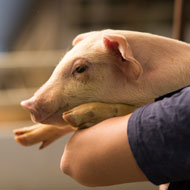
Results show potential of technique to benefit the pork industry
Scientists have used gene-editing techniques to create pigs that are resistant to Porcine Reproductive and Respiratory Syndrome (PRRS).
In a first-of-its-kind study, researchers exposed these pigs to the virus to see if they became infected. They found that none of the pigs became ill when exposed to the virus, nor did blood tests find any trace of infection.
Dr Christine Tait-Burkard, of the University of Edinburgh’s Roslin Institute, said the results were exciting but stressed that it will still be many years before we’ll be producing food from PRRS-resistant pigs.
“First and foremost we need broader public discussion on the acceptability of gene-edited meat entering our food chain, to help inform political leaders on how these techniques should be regulated,” she said. “We also need to carry out long-term studies to confirm that these genetic changes do not have any unforeseen adverse effects on the animals.
PRRS is an economically devastating disease that costs the pig industry some $2.5 billion in the US and Europe alone. Most vaccines have not been successful in preventing the spread of the virus, which continues to evolve.
The virus infects pigs using a receptor in their cells’ surface called CD163. Researchers at the University of Edinburgh’s Roslin Institute used gene-editing techniques to remove a small section of this gene.
Previous studies have shown that cells from these animals were resistant to the virus in lab tests. But this is the first time researchers have exposed these pigs to the virus to see if they become infected.
The study was funded by the Biotechnology and Biological Sciences Research Council and Genus PLC and is published in the Journal of Virology.
Genus chief scientific officer Jonathan Lightner said: “These results are very exciting and further underscore the potential, through gene editing, to provide incredible benefits to the global pork industry, and society as a whole, by improving animal health.”



 The RCVS has announced a new version of its 1CPD mobile app, with enhanced features for veterinary surgeons and veterinary nurses to record their continuing professional development.
The RCVS has announced a new version of its 1CPD mobile app, with enhanced features for veterinary surgeons and veterinary nurses to record their continuing professional development.